英语语法+英语语法的主要内容
初中英语语法有哪些重点内容?
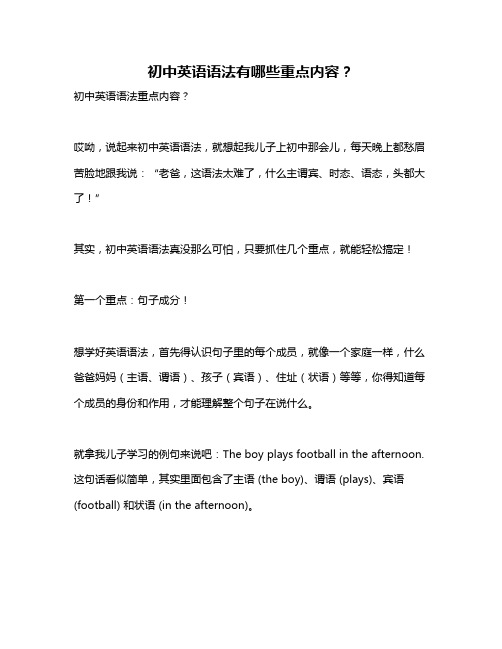
初中英语语法有哪些重点内容?初中英语语法重点内容?哎呦,说起来初中英语语法,就想起我儿子上初中那会儿,每天晚上都愁眉苦脸地跟我说:“老爸,这语法太难了,什么主谓宾、时态、语态,头都大了!”其实,初中英语语法真没那么可怕,只要抓住几个重点,就能轻松搞定!第一个重点:句子成分!想学好英语语法,首先得认识句子里的每个成员,就像一个家庭一样,什么爸爸妈妈(主语、谓语)、孩子(宾语)、住址(状语)等等,你得知道每个成员的身份和作用,才能理解整个句子在说什么。
就拿我儿子学习的例句来说吧:The boy plays football in the afternoon. 这句话看似简单,其实里面包含了主语 (the boy)、谓语 (plays)、宾语(football) 和状语 (in the afternoon)。
我当时给他举了个例子:就像我们经常说:“小明(主语)在操场(状语)踢足球(谓语)”。
我把“小明”比喻成主语,“踢足球”比喻成谓语,“在操场” 比喻成状语,他还挺爱听的,说:“老爸,你这讲课方式有点儿意思啊!”第二个重点:时态!时态就像记录时间发生的工具,告诉我们事情是在什么时候发生的。
初中主要学习现在时、过去时和将来时,还有进行时、完成时等等。
比如,我儿子学了现在进行时,他就很兴奋地跟我说:“老爸,你看,我正在写作业呢!这叫现在进行时!"我当时也挺开心的,就说:“没错,这是现在进行时,表示正在进行的动作,你写作业的时候,时间还在进行中”。
然后,我趁机给他讲了讲过去时和将来时:"比如,你昨天写了作业,那就是过去时;你明天要写作业,那就是将来时。
”第三个重点:语态!语态指句子中主语和谓语之间的关系,简单来说就是谁执行了这个动作。
初中主要学习主动语态和被动语态。
比如:The boy kicked the football. ( 主动语态:男孩踢了足球 )The football was kicked by the boy. ( 被动语态:足球被男孩踢了 )我儿子当时学习被动语态的时候,就有点懵,我说:"你看,第一个句子是男孩踢了足球,主动语态,重点在男孩身上;第二个句子是足球被男孩踢了,是被动语态,重点在足球身上。
英语语法的完整体系
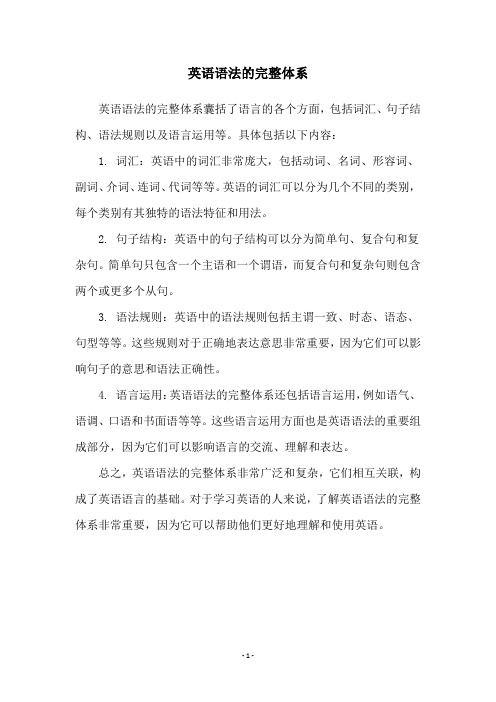
英语语法的完整体系
英语语法的完整体系囊括了语言的各个方面,包括词汇、句子结构、语法规则以及语言运用等。
具体包括以下内容:
1. 词汇:英语中的词汇非常庞大,包括动词、名词、形容词、副词、介词、连词、代词等等。
英语的词汇可以分为几个不同的类别,每个类别有其独特的语法特征和用法。
2. 句子结构:英语中的句子结构可以分为简单句、复合句和复杂句。
简单句只包含一个主语和一个谓语,而复合句和复杂句则包含两个或更多个从句。
3. 语法规则:英语中的语法规则包括主谓一致、时态、语态、句型等等。
这些规则对于正确地表达意思非常重要,因为它们可以影响句子的意思和语法正确性。
4. 语言运用:英语语法的完整体系还包括语言运用,例如语气、语调、口语和书面语等等。
这些语言运用方面也是英语语法的重要组成部分,因为它们可以影响语言的交流、理解和表达。
总之,英语语法的完整体系非常广泛和复杂,它们相互关联,构成了英语语言的基础。
对于学习英语的人来说,了解英语语法的完整体系非常重要,因为它可以帮助他们更好地理解和使用英语。
- 1 -。
小学生需要掌握的英语语法内容

小学生需要掌握的英语语法内容
一、名词和冠词
1. 名词是表示人、事物、地点等名称的词。
名词可以分为专有名词和普通名词。
2. 冠词是放在名词前面的词,用来修饰名词,表示名词的种类、数量、范围等。
二、动词和时态
1. 动词是表示动作或状态的词。
动词时态表示动作发生的时间和进行的状态。
2. 常见的小学英语动词时态包括现在进行时、现在完成时、一般现在时等。
三、形容词和副词
1. 形容词是修饰名词的词,表示名词的性质、状态等。
2. 副词是修饰动词、形容词或其他副词的词,表示动作的程度、频率等。
四、代词和介词
1. 代词是代替名词的词,分为人称代词、物主代词等。
2. 介词是放在名词或代词前面,表示时间、地点、方向等的词。
五、连词和从句
1. 连词是连接两个句子或从句的词,表示句子间的关系。
2. 从句是句子中的一部分,用引导词引导,构成句子的主干。
六、特殊句式和语序
1. 特殊句式包括疑问句、祈使句、感叹句等。
2. 语序是句子中词语的排列顺序,一般遵循主语+谓语+宾语的结构。
七、主谓一致和动词时态一致
1. 主谓一致是指主语和谓语在人称和数上的一致性。
2. 动词时态一致是指根据动作发生的时间和进行的状态选择合适的动词时态。
八、语气和情态动词
1. 语气是指表达者使用的语调、语气的变化,包括陈述语气、疑问语气、祈使语气等。
2. 情态动词是表示可能性的动词,如can、may、must等。
全部英语语法

全部英语语法由于英语语法内容较多,这里只能简单概述:1. 词法:名词:可数名词与不可数名词、名词的复数形式等。
代词:人称代词、物主代词、反身代词等。
动词:现在时、过去时、将来时等时态,以及各种形式(如进行时、完成时)。
形容词:比较级与最高级,以及形容词的位置。
副词:比较级与最高级,以及副词的位置。
介词:常用介词及其用法。
连词:常用连词及其用法。
2. 句法:主语与谓语:句子中的主要成分,以及主谓一致。
宾语:直接宾语与间接宾语。
状语:时间状语、地点状语等。
语序:正常语序、倒装语序等。
从句:名词性从句、定语从句、状语从句等。
3. 特殊结构:虚拟语气:与现在事实相反、与过去事实相反、与将来事实相反的虚拟语气。
强调句型:“It is/was...that...”结构。
省略句:为了简洁表达而省略某些成分的句子。
4. 常用表达:常用短语和固定搭配。
常见错误表达和正确表达。
5. 日常交流:常用口语表达和句型。
日常交流中的常见语境和话题。
6. 写作技巧:句子结构:简单句、复合句、并列句等。
段落结构:主题句、扩展句、结论句等。
7. 实际应用:各类英语考试的语法重点和难点。
工作场合中的商务英语语法和表达方式。
8. 文化背景:英语国家的文化背景和传统习俗,以及与中文的差异。
9. 进阶学习:深入了解英语语法中的复杂结构和特殊规则。
10. 自学方法:如何高效地自学英语语法,以及如何通过大量阅读和实践来提高英语语法水平。
初中初一上册英语语法
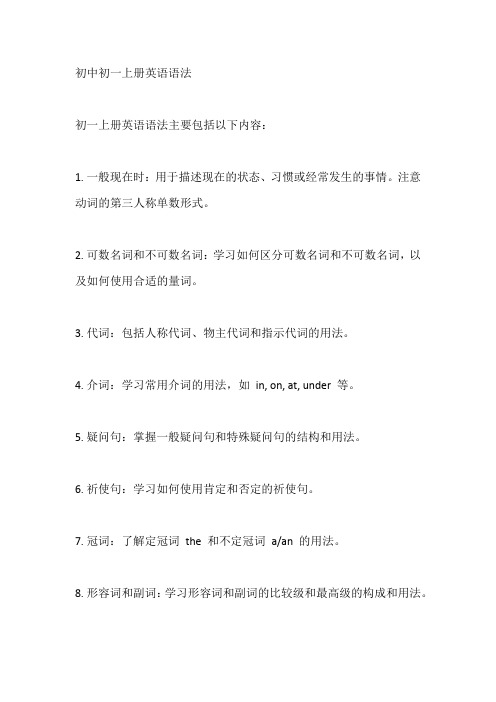
初中初一上册英语语法
初一上册英语语法主要包括以下内容:
1.一般现在时:用于描述现在的状态、习惯或经常发生的事情。
注意动词的第三人称单数形式。
2.可数名词和不可数名词:学习如何区分可数名词和不可数名词,以及如何使用合适的量词。
3.代词:包括人称代词、物主代词和指示代词的用法。
4.介词:学习常用介词的用法,如in, on, at, under 等。
5.疑问句:掌握一般疑问句和特殊疑问句的结构和用法。
6.祈使句:学习如何使用肯定和否定的祈使句。
7.冠词:了解定冠词the 和不定冠词a/an 的用法。
8.形容词和副词:学习形容词和副词的比较级和最高级的构成和用法。
9.句型:熟悉一些基本的英语句型,如肯定句、否定句、疑问句等。
这些是初一上册英语语法的一些主要内容。
在学习过程中,要多做练习,加深对语法规则的理解和应用能力。
同时,多阅读英语文章,提高语感和语法的实际运用能力。
英语语法核心知识点归纳

英语语法核心知识点归纳英语语法是英语学习中至关重要的一部分,它就像建筑的框架,支撑着整个语言体系。
掌握好语法,能够让我们更准确、流畅地表达自己的想法。
下面,就让我们一起来归纳一下英语语法的核心知识点。
一、词性词性是语法的基础,英语中的词性主要包括名词、动词、形容词、副词、代词、介词、连词、数词和冠词等。
名词表示人、事物、地点或抽象概念。
比如“book(书)”“city(城市)”“love(爱)”。
动词则是表示动作或状态,如“run(跑)”“sleep(睡觉)”“be (是)”。
形容词用来描述或修饰名词,像“beautiful(美丽的)”“big(大的)”“happy(快乐的)”。
副词用于修饰动词、形容词、其他副词或整个句子,例如“quickly (快速地)”“very(非常)”“fortunately(幸运地)”。
代词用来替代名词,比如“he(他)”“she(她)”“it(它)”“they (他们)”等。
介词通常用于表示名词或代词与其他词的关系,常见的有“in (在……里面)”“on(在……上面)”“at(在……)”。
连词用于连接单词、短语或句子,像“and(和)”“but(但是)”“or (或者)”。
数词分为基数词和序数词,基数词表示数量,如“one(一)”“two (二)”;序数词表示顺序,如“first(第一)”“second(第二)”。
冠词分为定冠词“the”和不定冠词“a/an”,用于限定名词。
二、句子成分了解句子成分对于理解和构造正确的句子非常重要。
句子成分主要包括主语、谓语、宾语、表语、定语、状语和补语。
主语是句子中执行动作或被描述的主体,通常是名词或代词。
谓语则是表示主语的动作或状态,由动词充当。
宾语是动作的对象,常为名词或代词。
表语用于说明主语的性质、特征或状态,常由形容词、名词或介词短语等充当。
定语用于修饰名词或代词。
状语用于描述动作发生的时间、地点、方式、原因等。
补语用于补充说明宾语或主语的情况。
英语语法定义
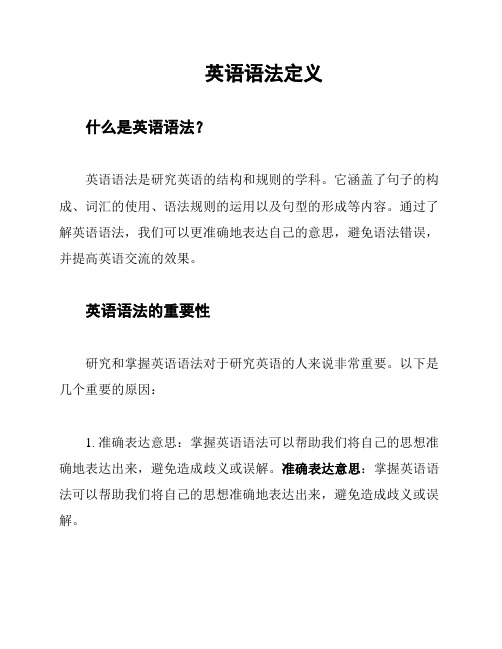
英语语法定义什么是英语语法?英语语法是研究英语的结构和规则的学科。
它涵盖了句子的构成、词汇的使用、语法规则的运用以及句型的形成等内容。
通过了解英语语法,我们可以更准确地表达自己的意思,避免语法错误,并提高英语交流的效果。
英语语法的重要性研究和掌握英语语法对于研究英语的人来说非常重要。
以下是几个重要的原因:1. 准确表达意思:掌握英语语法可以帮助我们将自己的思想准确地表达出来,避免造成歧义或误解。
准确表达意思:掌握英语语法可以帮助我们将自己的思想准确地表达出来,避免造成歧义或误解。
2. 避免语法错误:良好的英语语法能够帮助我们避免犯常见的语法错误,使我们在写作和口语表达中更加流利和专业。
避免语法错误:良好的英语语法能够帮助我们避免犯常见的语法错误,使我们在写作和口语表达中更加流利和专业。
3. 提高阅读理解:了解英语语法的规则可以帮助我们更好地理解英语文本,从而提高我们的阅读理解能力。
提高阅读理解:了解英语语法的规则可以帮助我们更好地理解英语文本,从而提高我们的阅读理解能力。
4. 提高写作技巧:掌握语法规则可以帮助我们在写作时更好地组织句子和段落,使我们的写作更有逻辑性和连贯性。
提高写作技巧:掌握语法规则可以帮助我们在写作时更好地组织句子和段落,使我们的写作更有逻辑性和连贯性。
5. 增加听力理解能力:熟悉英语语法可以帮助我们更好地理解他人的口语表达,提高我们的听力理解能力。
增加听力理解能力:熟悉英语语法可以帮助我们更好地理解他人的口语表达,提高我们的听力理解能力。
英语语法的主要内容英语语法包含多个主要的方面:1. 词汇:了解词汇的分类、词性、词义、词组搭配等内容,可以帮助我们使用词汇更加准确和灵活。
词汇:了解词汇的分类、词性、词义、词组搭配等内容,可以帮助我们使用词汇更加准确和灵活。
2. 句子的构成:了解句子的基本结构,包括主语、谓语、宾语、定语和状语等,可以帮助我们正确构建句子。
句子的构成:了解句子的基本结构,包括主语、谓语、宾语、定语和状语等,可以帮助我们正确构建句子。
英语整个语法体系
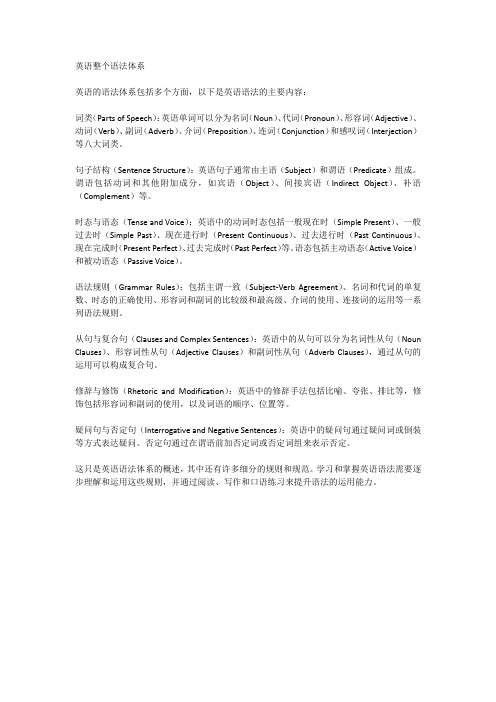
英语整个语法体系英语的语法体系包括多个方面,以下是英语语法的主要内容:词类(Parts of Speech):英语单词可以分为名词(Noun)、代词(Pronoun)、形容词(Adjective)、动词(Verb)、副词(Adverb)、介词(Preposition)、连词(Conjunction)和感叹词(Interjection)等八大词类。
句子结构(Sentence Structure):英语句子通常由主语(Subject)和谓语(Predicate)组成。
谓语包括动词和其他附加成分,如宾语(Object)、间接宾语(Indirect Object)、补语(Complement)等。
时态与语态(Tense and Voice):英语中的动词时态包括一般现在时(Simple Present)、一般过去时(Simple Past)、现在进行时(Present Continuous)、过去进行时(Past Continuous)、现在完成时(Present Perfect)、过去完成时(Past Perfect)等。
语态包括主动语态(Active Voice)和被动语态(Passive Voice)。
语法规则(Grammar Rules):包括主谓一致(Subject-Verb Agreement)、名词和代词的单复数、时态的正确使用、形容词和副词的比较级和最高级、介词的使用、连接词的运用等一系列语法规则。
从句与复合句(Clauses and Complex Sentences):英语中的从句可以分为名词性从句(Noun Clauses)、形容词性从句(Adjective Clauses)和副词性从句(Adverb Clauses),通过从句的运用可以构成复合句。
修辞与修饰(Rhetoric and Modification):英语中的修辞手法包括比喻、夸张、排比等,修饰包括形容词和副词的使用,以及词语的顺序、位置等。
全部英语语法知识

全部英语语法知识英语语法知识涵盖面非常广泛,下面为您简要列举了一些主要内容:1. 名词:名词是表示人、事物、抽象概念等实物的词。
2. 冠词:冠词用于修饰名词,帮助读者更好地理解名词的含义。
3. 代词:代词是用来代替名词的词,如人称代词、物主代词等。
4. 动词:动词是表示动作或状态的词,如be动词、助动词、情态动词等。
5. 形容词和副词:形容词用于描述名词的特性,副词用于描述动词的方式和程度。
6. 介词:介词用于连接名词或代词,表示方向、位置、时间等关系。
7. 连词:连词用于连接两个或多个句子,表示它们之间的关系。
8. 句子的结构:了解简单句、复合句和并列句的区别。
9. 时态:时态是表示动作发生的时间和状态的语法形式,如现在时、过去时、将来时等。
10. 语态:语态是表示动作与主语之间的关系,如主动语态和被动语态。
11. 语气:语气是表示说话人的态度和意图的语法形式,如陈述语气、祈使语气和虚拟语气。
12. 从句:从句是用来修饰主句的句子,可以分为名词从句、定语从句和状语从句等。
13. 主谓一致:主谓一致是指主语和谓语在语法形式上保持一致,如单数主语使用单数谓语,复数主语使用复数谓语。
14. 非谓语动词:非谓语动词是指不充当谓语的动词形式,如不定式、动名词和分词等。
15. 虚拟语气:虚拟语气是表示假设或想象情况的语法形式,通常用于表达与现实相反的情况或表达强烈的情感或愿望。
16. 倒装结构:倒装结构是指将句子中的成分颠倒顺序,以达到强调或使句子更加流畅的效果。
以上仅是英语语法知识的一部分内容,如果要系统学习并掌握这些知识,需要不断地学习和练习。
高中生需要掌握的英语语法内容

高中生需要掌握的英语语法内容一、名词、代词、冠词的用法1. 名词:高中生需要掌握名词的复数形式、名词的所有格等用法。
2. 代词:代词在句子中可以代替名词、形容词等,高中生需要掌握人称代词、物主代词、指示代词等的用法。
3. 冠词:冠词用来修饰名词,高中生需要掌握不定冠词“a/an”和定冠词“the”的用法。
二、动词的时态和语态1. 时态:高中生需要掌握一般现在时、一般过去时、一般将来时等基本时态的用法,以及进行时态、完成时态等复杂时态的用法。
2. 语态:语态表示动作与承受者之间的关系,高中生需要掌握主动语态和被动语态的用法。
三、形容词、副词的比较级和最高级1. 形容词和副词的比较级:形容词和副词的比较级表示两者之间的比较关系,高中生需要掌握比较级的构成和用法。
2. 形容词和副词的最高级:最高级表示三者或三者以上之间的最高程度,高中生需要掌握最高级的构成和用法。
四、各类从句的用法1. 名词性从句:名词性从句在句子中充当名词的作用,高中生需要掌握主语从句、宾语从句、表语从句等的用法。
2. 定语性从句:定语性从句在句子中充当定语的作用,高中生需要掌握关系代词引导的定语性从句的用法。
3. 状语性从句:状语性从句在句子中充当状语的作用,高中生需要掌握时间状语从句、条件状语从句、原因状语从句等的用法。
五、虚拟语气虚拟语气表示与实际情况相反的情况,或者是对于某些假设条件的表达,高中生需要掌握虚拟语气的用法。
六、非谓语动词的用法非谓语动词包括动词不定式、动名词和分词,它们在句子中不能作谓语,但是可以作主语、宾语、定语等成分,高中生需要掌握这些非谓语动词的用法。
七、倒装句和省略句1. 倒装句:倒装句是一种语法结构上的倒置,分为全部倒装和部分倒装,高中生需要掌握倒装句的构成和用法。
2. 省略句:省略句是在句子中省略掉一些不必要的成分,但是仍然能够表达完整的意思,高中生需要掌握省略句的特点和用法。
八、常见句型和固定搭配1. 常见句型:高中生需要掌握一些常见的英语句型,如“there be”句型、“it”作为形式主语的句型等。
史上最全的英语语法大全(精心整理)

英语语法1.名词1.1名词复数的规则变化1.2其他名词复数的规则变化1.3名词复数的不规则变化1.4不可数名词量的表示1.5定语名词的复数1.6不同国家的人的单复数1.7名词的格2.冠词和数词2.1不定冠词的用法2.2定冠词的用法2.3零冠词的用法2.4冠词与形容词+名词结构2.5冠词位置2.6数词3.代词3.1人称代词的用法3.2人称代词之主、宾格的替换3.3代词的指代问题3.4并列人称代词的排列顺序3.5物主代词3.6双重所有格3.7反身代词3.8相互代词3.9指示代词3.10疑问代词3.11关系代词3.12every,no,all,both,neither,nor3.13none,few,some,any,one,ones3.14代词比较辩异one,that和it3.15one/another/the other3.16“the”的妙用3.17anyone/any one;no one/none;every/each 3.18both,either,neither,all,any,none 3.19many,much3.20few,little,a few,a little4.形容词和副词4.1形容词及其用法4.2以-ly结尾的形容词4.3用形容词表示类别和整体4.4多个形容词修饰名词的顺序4.5副词及其基本用法4.6兼有两种形式的副词4.7形容词与副词的比较级4.8as+形容词或副词原级+as 4.9比较级形容词或副词+than 4.10可修饰比较级的词4.11many,old和far4.12the+最高级+比较范围4.13和more有关的词组5.动词5.1系动词5.2什么是助动词5.3助动词be的用法5.4助动词have的用法5.5助动词do的用法5.6助动词shall和will的用法5.7助动词should和would的用法5.8短语动词5.9非谓语动词6.动名词6.1动名词作主语、宾语和表语6.2Worth的用法7动词不定式7.1不定式作宾语7.2不定式作补语7.3不定式主语7.4It's for sb.和It's of sb.7.5不定式作表语7.6不定式作定语7.7不定式作状语7.8用作介词的to7.9省to的动词不定式7.10动词不定式的否定式7.11不定式的特殊句型too…to…7.12不定式的特殊句型so as to 7.13不定式的特殊句型Why not 7.147不定式的时态和语态7.15动名词与不定式8.特殊词精讲8.1stop doing/to do8.2forget doing/to do8.3remember doing/to do8.4regret doing/to do8.5cease doing/to do8.6try doing/to do8.7go on doing/to do英语微信群是目前学习英语最有效的方法,群里都是说英语,没有半个中文,而且规则非常严格,是一个超级不错的英语学习环境,群里有好多英语超好的超牛逼的人,还有鬼佬和外国美眉。
小学英语语法主要知识点总结

小学英语语法主要知识点总结01小学英语形容词性物主代词1、形容词性物主代词8个:My your his her its our your their我的你的他的她的它的我们的你们的他(她、它)们的2、形容词性物主代词的特点:1)译成汉语都有"的" eg:my 我的 their 他们的2)后面加名词:eg:my backpack his name3)前后不用冠词 a an theThis is a my eraser(错误)That is your a pen(错误)It's his the pen(错误)3、I(物主代词)my you(物主代词)your he (物主代词)her we (物主代词) our注:在变物主代词时,把原题所给的词加上的,再译成单词就可以了。
02小学英语名词性物主代词1、名词性物主代词和形容词性物主代词一样有8个:Mine yours his hers its ours yours theirs我的你的他的她的它的我们的你们的他(她、它)们的2、名词性物主代词的特点:1)译成汉语都有"的"2)后面不加名词3)名词性物主代词=形容词性物主代词+名词Eg:1、the pen is mine 钢笔是我的(mine=my pen)03小学英语单数的句子变成复数的句子把单数的句子成复数的句子很简单:变法是把能变成复数的词变成复数,但a或an要把去掉。
特殊疑问词、形容词、国家及地点通常不变。
Eg:把下列句子变成复数1, I have a car ----we have cars2, He is an American boy. ----They are American boys3, It is a car ----They are cars4,This is an eraser ----These are erasers5,That is a backpsck -----Those are backpacks6,I'm an English teather ------We are English teathers7,It's a new shirt---- They are new shirts8,He's a boy ----They are boys9,She's a singer ------They are singers10,What'sthis in English?---- What are these in English?04小学英语名词的数语法名词有单数和复数两种形式1、名词的单数:表示一个人或一个事物2、名词的复数:表示一个人以上的人或事物名词复数的变化规律如下:1、多数情况下在名词后面加S,s 在清辅音后读【S】2、以s,x,sh,ch为结尾的词在词尾加es, es读作【iz】3、以f ,fe为结尾的词去掉f或fe加ves,ves读作【vz】4、以辅音加y 结尾的词,变y为ies5、以元音加y结尾的词,直接加s6、不规则变化Man-menwoman-women policeman-policemenPolicewoman-policewomen这种情况下a变成e7、单复数同形Chinese-chinese Japanese-japanese sheep -sheep deer -deer8、 This 这个these这些(复数) that那个 those那些(复数) I我 we我们(复数) he他 she她 it它 they他、它、她们(复数) am ,is是 are(复数)05小学英语人称代词主格及宾格人称代词分为主格和宾格,主格和宾格区别:主格和宾格汉语意思相同,但位置不同。
英语的语法结构
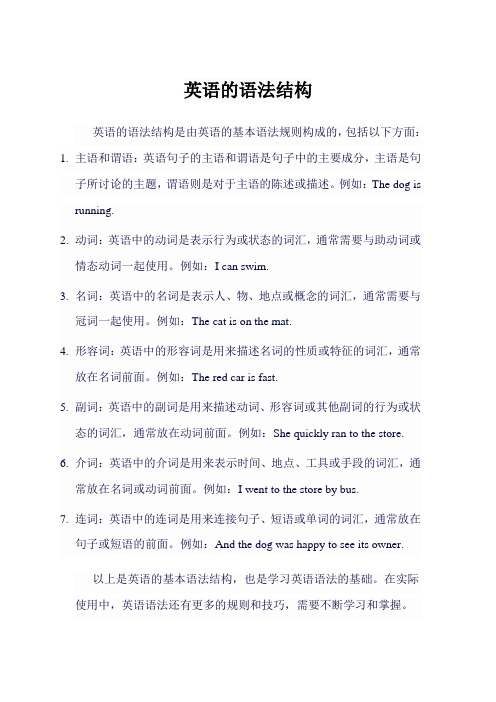
英语的语法结构
英语的语法结构是由英语的基本语法规则构成的,包括以下方面:1.主语和谓语:英语句子的主语和谓语是句子中的主要成分,主语是句
子所讨论的主题,谓语则是对于主语的陈述或描述。
例如:The dog is running.
2.动词:英语中的动词是表示行为或状态的词汇,通常需要与助动词或
情态动词一起使用。
例如:I can swim.
3.名词:英语中的名词是表示人、物、地点或概念的词汇,通常需要与
冠词一起使用。
例如:The cat is on the mat.
4.形容词:英语中的形容词是用来描述名词的性质或特征的词汇,通常
放在名词前面。
例如:The red car is fast.
5.副词:英语中的副词是用来描述动词、形容词或其他副词的行为或状
态的词汇,通常放在动词前面。
例如:She quickly ran to the store. 6.介词:英语中的介词是用来表示时间、地点、工具或手段的词汇,通
常放在名词或动词前面。
例如:I went to the store by bus.
7.连词:英语中的连词是用来连接句子、短语或单词的词汇,通常放在
句子或短语的前面。
例如:And the dog was happy to see its owner.
以上是英语的基本语法结构,也是学习英语语法的基础。
在实际使用中,英语语法还有更多的规则和技巧,需要不断学习和掌握。
英语语法学

英语语法学英语语法学是研究英语语言规则和结构的学科,它包括词法、句法、语义学、语用学、语态学、时态和语态、名词性从句、关系从句、虚拟语气以及强调句型等方面。
1.词法(Morphology)词法是研究单词的构成和变化的规则。
英语单词通常由词根、前缀、后缀等构成,通过添加不同的前缀和后缀,单词的含义和用法会发生变化。
2.句法(Syntax)句法是研究句子结构的规则。
在英语中,句子通常由主语和谓语构成,主语通常在谓语之前,宾语和补语通常在谓语之后。
此外,句子的结构还包括从句、短语、介词短语等。
3.语义学(Semantics)语义学是研究语言意义和理解的规则。
语义学涉及单词和句子的含义、指代、修饰等内容。
通过理解单词和句子的含义,我们可以更好地理解文本的意思。
4.语用学(Pragmatics)语用学是研究语言使用和交流的规则。
语用学涉及语言在社会和文化背景下的使用,包括对话、演讲、写作等。
通过理解语用学,我们可以更好地理解语言在社会和文化背景下的含义和使用。
5.语态学(Voice)与时态和语态(Tense and Voice)语态学是研究动词的形式和变化的规则。
动词的形式包括现在时、过去时、将来时等时态,以及主动语态和被动语态等。
通过理解动词的形式和变化,我们可以更好地理解句子的意思和语气。
6.名词性从句(Noun clauses)、关系从句(Relative clauses)与虚拟语气(Subjunctive)名词性从句是由一个句子作为名词的成分,通常在主句中充当主语、宾语或表语等。
关系从句是用来修饰名词性从句的从句,通常用来提供更多关于名词性从句中提到的名词的信息。
虚拟语气是一种特殊的动词形式,用来表达假设或条件的情况,而不是真实的情况。
7.强调句型(Emphatic structures)强调句型是用来强调句子中某个成分的特殊语法结构。
通过使用强调句型,我们可以突出句子中的某个部分,使其更加明显或重要。
英语中的几大语法点
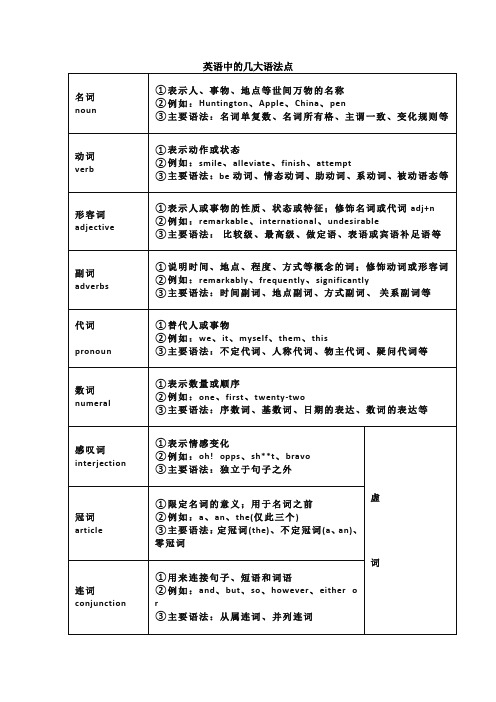
I would have been doing my homework.
时态
定义
一般现在时
表示客观事实或某种规律。
一般将来时
表示将来发生的动作、计划打算的动作。
一般过去时
表示过去的动作、过去习惯性的动作。
现在进行时
表示现在正在发生的动作。
现在完成时
表示现在已经完成的动作对现在的影响或持续到现在。
形容词
adjective
①表示人或事物的性质、状态或特征;修饰名词或代词adj+n
②例如:remarkable、international、undesirable
③主要语法: 比较级、最高级、做定语、表语或宾语补足语等
副词
adverbs
①说明时间、地点、程度、方式等概念的词;修饰动词或形容词
②例如:remarkably、frequently、significantly
①修饰主语或宾语的词;多为形容词
②eg:I eat the yellow bananas.
我吃黄色的香蕉。
状语
adverbial
①表示动作发生的时间、地点、原因、目的、结果、方式
②eg:I eat the banana quickly.
我快速地吃香蕉。
补足语
complement
①又称宾语补足语,对宾语的进一步说明
主 + 谓 + 双 宾
(跟两个动作承受者)
①表明主语把某物给某人;
②谓语动词为实义动词,有具体动作,有两个宾语
③eg: She bought me a gift.她给我买了一个礼物。
主 + 谓 + 宾 + 宾 补
英语 单词语法

英语单词语法英语单词语法主要包括以下几点:1. 词汇:单词是英语的基础,掌握了一定数量的单词,才能更好地理解和表达。
学习单词时,可以通过记忆单词的词性、用法和搭配来加深理解。
2. 语法:英语语法包括词法、句法和语篇法。
词法主要包括名词、动词、形容词、副词等词性的用法;句法主要研究句子结构,如主谓宾结构、主系表结构等;语篇法则关注篇章的组织和连贯。
3. 句型:英语句型包括简单句、复合句、并列句等。
掌握各种句型有助于更灵活地表达思想和情感。
4. 动词时态:英语动词有多种时态,如一般现在时、一般过去时、一般将来时等。
正确使用动词时态,能使句子更准确地表达时间概念。
5. 被动语态:被动语态用于强调动作的接受者。
掌握被动语态的使用,能使句子更丰富、表达更准确。
6. 情态动词:情态动词如can、may、must等,用于表示说话人的态度、推测等。
正确使用情态动词,有助于提高表达的准确性。
7. 介词:介词后接名词或代词,表示事物之间的关系。
英语中有大量介词,如of、in、on、at等。
掌握常用介词的用法,有助于更准确地表达地点、时间等概念。
8. 连词:连词用于连接句子,如and、but、because等。
掌握连词的用法,能使句子更连贯。
9. 主从句:主从句是英语句子的重要组成部分。
主句承担主要表达任务,从句则起补充说明作用。
掌握主从句的用法,能使句子结构更清晰。
10. 篇章结构:英语篇章由段落和句子组成。
了解篇章结构,有助于提高写作和阅读能力。
以上是英语单词语法的主要内容。
在学习过程中,可以通过背句子、阅读英文文章、参加英语角等多种方式来提高自己的英语水平。
初中英语语法与高中英语语法的区别

初中英语语法与高中英语语法的区别摘要:1.初中英语语法与高中英语语法的总体区别2.初中英语语法的主要内容3.高中英语语法的主要内容4.初中与高中语法在词汇、句型和结构上的差异5.如何在过渡阶段更好地学习和掌握英语语法正文:随着年龄的增长,学生们逐渐从初中过渡到高中,英语学习也不例外。
在这个过程中,英语语法发生了很大的变化。
为了更好地理解和掌握英语语法,了解初中英语语法与高中英语语法的区别是非常重要的。
首先,我们来了解一下初中英语语法的主要内容。
初中的英语语法主要侧重于基本词汇、简单句型和句子结构。
学生需要掌握的语法点包括名词、动词、形容词、副词等词性的用法,以及疑问句、祈使句、感叹句等简单句型的构成。
初中的英语语法目标是使学生具备基本的英语听说读写能力,为高中的深入学习打下基础。
接下来,我们看看高中英语语法的主要内容。
与初中相比,高中英语语法更加复杂和深入。
高中英语语法涉及词汇的用法、句子的构造和语篇的组织等方面。
在这个阶段,学生需要学习诸如时态、语态、主被动关系、虚拟语气等更高级的语法知识。
同时,学生还需要学会如何运用这些语法知识来表达自己的观点,进行有效的沟通。
在初中与高中语法过渡阶段,学生在词汇、句型和结构上会遇到一些差异。
例如,在词汇方面,高中英语要求学生掌握更多的高级词汇和短语,以便更好地表达自己的思想和观点。
在句型方面,高中英语句子更加复杂,需要学生熟练运用各种从句、并列句等结构。
在结构方面,高中英语语法要求学生更加注意句子成分的搭配和语篇的连贯性。
为了在过渡阶段更好地学习和掌握英语语法,学生可以采取以下策略:1.巩固初中英语语法基础知识,为学习高中英语语法打下基础。
2.扩大词汇量,学习高级词汇和短语,提高表达能力。
3.多做练习,尤其是高中英语语法相关的题目,提高解题能力。
4.注重实际应用,将所学语法知识运用到日常生活和学习中。
5.养成良好的学习习惯,定期复习和总结,防止遗忘。
总之,初中英语语法与高中英语语法在词汇、句型和结构上存在很大差异。
英语语法知识全部

直接宾语、间接宾语、宾语从句
定语与状语
定语修饰名词或代词,状语修饰动词、形容词、副词或整个句子
同位语
对名词或代词进行补充说明的词或短语
时态与语态
时态
现在时、过去时、将来时、现在进行时、过去进行时、将来进行时、现在完成时、过去完成时、将来完成时等
语态
主动语态、被动语态
语气
陈述语气
陈述事实或意见
疑问语气
提出问题
祈使语气
发出命令或请求
虚拟语气
表达与事实相反或不可能的情况
其他
主谓一致
主语与谓语在人称、数上保持一致
倒装句
为了强调或满足语法需要,将句子成分的位置颠倒
省略句
省略句子中的某些成分,但不影响句子的完整性和意义
英语语法知识全部
类别
主要内/概念
词法
名词
可数与不可数名词、所有格、复数形式
代词
人称代词、物主代词、反身代词、指示代词、疑问代词、关系代词、不定代词
形容词
原级、比较级、最高级、形容词短语
副词
原级、比较级、最高级、副词短语、修饰动词、形容词或其他副词
动词
时态(现在时、过去时、将来时、完成时等)、语态(主动语态、被动语态)、非谓语动词(不定式、动名词、分词)、助动词、情态动词
冠词
定冠词、不定冠词、零冠词
介词
表示位置、方向、时间等关系的词,常与名词或代词连用
连词
并列连词(如and, but, or)、从属连词(如because, when, if)
感叹词
表达情感或呼唤的词,如oh, ah, well, hmm
句法
句子结构
简单句、并列句、复合句、主句与从句
- 1、下载文档前请自行甄别文档内容的完整性,平台不提供额外的编辑、内容补充、找答案等附加服务。
- 2、"仅部分预览"的文档,不可在线预览部分如存在完整性等问题,可反馈申请退款(可完整预览的文档不适用该条件!)。
- 3、如文档侵犯您的权益,请联系客服反馈,我们会尽快为您处理(人工客服工作时间:9:00-18:30)。
美联英语提供:英语语法的主要内容关于英语那些你不知道的事都在这里/test/quwen.aspx?tid=16-73675-0第一讲:英语语法的主要内容一、英语语言的特点在不同的语言中,句子内部连接或外部连接几乎都使用三种手段:句法手段、词汇手段、语义手段。
用前两种手段连接称为“形合”,用后一种手段连接称为“意合”。
从英语的语法特点来看,英语注重“主谓”结构;语法关系主要是通过词本身的形态变化以及虚词、词序等手段来表示的;英语句子除了主、谓、宾(表)这个主干外,还往往携带有从句、短语或独立结构等各种修饰成分(附加语),其定语和状语可以一环套一环,修饰中另有修饰或限定,形成了错综复杂的结构;英语句子是通过严整的结构交待清楚各板块之间的相互关系,就其本身结构的词序而言,英语句子存在着违反逻辑思维自然顺序的现象。
英语的所谓“形合”是由该语言的各级语言单位及其组合的结构形式决定的。
汉语是以“意合”为主的语言,注重“主题+说明”结构,汉语各级语言单位的组合,不靠形态的变化,而是依靠语序和虚词由小到大的层层组合。
两个或两个以上的语言单位只要在语义上能搭配得拢,在逻辑事理上讲得通,符合语言习惯,就可以组合。
由于省略的成分较多,句子结构关系而变得既复杂严密,又简练经济等;语法上的主语通常就是逻辑上的主题。
二、英语语法的主要内容词法和句法词法:1、词类的划分:汉英在划分实词和虚词的标准上可以说是一致的。
实词, 就是在句中能单独作句子成分的词。
虚词, 就是在句中不能单独作句子成分的词。
汉语:(实词)名词动词数词量词代词形容词;(虚词) 副词介词连词助词感叹词英语:(实词)名词动词数词代词形容词副词;(虚词) 冠词介词连词感叹词2、词类的转化汉英语的词类都可以相互转化,名词和动词可以相互转化,形容词和副词可以相互转化,而英语就不行。
因为英语每一个句子成分都有严格的形式要求,即什么位置就有什么形式。
对比:1) 政府工作报告the report on the government.报告政府工作to report the government’s work2) 快车 a fast train.不要读得这么快. Don’t read so fast3、词形的变化英语的实词都有词形变化,并具有语法意义。
1) 动词的词形在句中随人称、数、时态、语态和语气发生变化。
2) 名词有单复数和所有格的变化。
3) 代词有人称、格、性和数的变化。
4) 形容词/副词有原级、比较级和最高级的变化。
4、英语独有的词类冠词是英语独有的词类。
冠词虽然是虚词,但其在句中的作用是很大的,它的用法既有规律性也有特殊性。
因此,在写作中,必须根据它的功能,上下文的关系以及习惯用法,来准确地使用冠词。
如:这位外科医生正在给两天前送这里的那位病人作手术。
The surgeon is operating on the patient sent here two days ago.5、词序在句法上,汉语的词序是重要的语法手段,词与词的结合比较自由,即结构关系往往不用形态标志来表示,成分省略较多才,使句子结构关系既复杂严密,又简练经济等;而英语句子除了主、谓、宾(表)这个主干外,还往往携带有各种修饰成分(如从句、短语或独立结构等),其定语和状语可以一环套一环,修饰中另有修饰或限定,形成了风回路转、错综复杂的结构。
如:The war to turn China into a U.S. colony, a war in which the United 战争变中国为美国殖民地一战争其中States of America supplies the money and guns and Chiang Kai-shek the men to fight美国供给钱和枪炮以及蒋介石(供给) 人去打仗for the United States and slaughter the Chinese people, has been an important为美国并屠杀中国人民已经是一个重大的component of the U.S. imperialist policy of world-wide aggression since World WarII.部分美国帝国主义政策属于全世界侵略自从世界大战二次。
战争变中国为美国殖民地一战争其中美国供给钱和枪炮以及蒋介石人去打仗为美国并屠杀中国人民已经是一个重大的部分美国帝国主义政策属于全世界侵略自从世界大战二次。
句法:英语的基本句型、时态、语态、语气、人称变化、单复数变化、直接引语和间接引语、倒装、主从复合句等。
句法离开不了词法,词法也离开不了句法,词法和句法在表达中相互制约、相互作用。
英语表达的思维特征1. 英汉语抽象与具体(抽象名词)1汉民族的思维是具体、直观的,汉语中尽可能地动用具体的词义来传递思想和信息;英语的思维则是抽象、概括的, 其倾向于使用抽象词义来表达观点,即英语单词的词义多用于抽象, 而汉语则习惯用于具体。
由于这两种语言的差别, 在很多时候英语中所包含的单词、词组和句子含义十分抽象, 为方便读者阅读, 消除有可能造成的歧义, 这时候就需要将原本抽象的含义具体化, 确保原文的可读性。
将其含义具体化符合事理的逻辑和汉语的表意习惯, 更能给读者一个完整的印象。
如:Tess sat up in bed, lost in a vague interspace between a dream and this information. Tess 1sat up in bed, 2lost in 3a vague interspace between 4a dream and 5this information.*苔丝从床上坐了起来, 迷失在梦和这个信息的茫然空隙之中。
(过于抽象,甚至晦涩到根本不能理解的程度)*苔丝从床上坐了起来, 一听这个话, 一半朦胧, 一半清醒, 一时不知如何是好。
(逻辑错误)句中包含了5个事件:1sat up in bed从床上坐了起来2lost in迷失在之中3a vague interspace处在……之中4a dream她在做梦或梦中5this information她听到消息按照时空逻辑重新排序为:4a dream她在做梦或梦中5this information她听到消息1sat up in bed从床上坐了起来2lost in迷失在之中3a vague interspace 处在……之中苔丝从床上坐了起来,由于还没睡醒,迷迷糊糊的,所以听了这话,一时也没反应过来是怎么回事。
2. 英语主语突出,汉语主题突出主题是语用上的概念,而主语是语法上的概念。
从对比的角度看,汉语是主题突出的语言,而英语是主语突出的语言。
主题突出的语言是指句子的基本结构是信息单位话题和评说的语言;主语突出的语言是指在该语言里主语和谓语是句子的基本结构,句子中通常都要有主语和谓语。
如:这把刀我以来切肉。
With this knife I slice meat.我用这把刀切肉。
I use this knife to slice meat.切肉我用这把刀。
To slice meat I use this knife.这把刀我切肉用。
This knife is used to slice meat (by me).我这把刀切肉用。
I slice meat with this knife.3. 英语长句,汉语的短句逻辑顺序,即语序,是英汉语表达时的差异主要差异之一。
一般来说英汉语的语言顺序是:英语语序:先出主语+ 最主要的部分(谓语或宾语或补语), 其他如定语、状语、插入语等不重要的成分再按照语法形式各归其所分别添加上去)。
主要是“主谓(宾)结构”。
汉语语序:先出主语(或宾语)+ 状语+ 最主要的部分(谓语或宾语或补语), 定语成分不管有多少一般都按照其可变性的大小依次放在名词前面。
主要是“主题+述题(说明)”。
More probable is transported by birds, /either externally, /by accidental attachment of the seeds to feathers, /or internally, /by the swallowing of fruit and subsequent excretion of the seeds.*更可能的是被鸟类运输,要么外部,通过偶然的羽毛对种子的黏附,要么内部,通过水果的吞食和随后的排泄。
更可能的是由鸟类运输,要么是通过外部途径,即由于种子偶然黏附在羽毛上;要么是通过内部的方式,即由于鸟类吞食果子并将种子排泄出来。
4. 英语的被动,汉语的主动主动与被动体现主语和谓语动词之间的语法关系。
所谓主动,是指行为的发出者在句子里是主语,即施事;而被动是指充当句子主语的是某一行为作用的对象,即受事。
5. 英语的静态,汉语的动态静态表达是英语中最常见的现象The doctor arrived extremely quickly and examined the patient uncommonly carefully; the result was that he recovered very speedily.The doctor’s extremely quick arrival and uncommonly careful examination of the patient brought about his very speedy recovery.医生迅速到达,并非常仔细地检查了病人,因此病人很快就康复了。
6. 主体意识和客体意识西方主张的是理性,前提是将客体与主体分离,对事物进行理性的分析思考和判断,从而形成概念;中国人主张主体(人)参与和溶入自然界,去感受和领悟世间万物。
这两种不同的思维方式势必会使言语的形式产生差异。
如英语的无灵主语句(it主语、时间/地点主语、there + be结构)、被动句(比汉语多)、名词(物)化主语句(包含宾语名词化)、含有一个名词的短语动词、等。
主体指的是有认识和实践能力的人;客体指主体以外的客观事物,是主体认识和实践的对象。
主体意识是指在意识上强调以主体为主,以人为本;客体意识指在意识上强调以客体为主。
英语以客体为主,而汉语以主体为主。
1)The thought of returning filled him with fear.想到回去让他心里充满了恐惧。
想到回去让他感到非常害怕。
想到还要回去,他害怕极了。
一想到还要回去,他心里就害怕。
2)During the meeting there were many silences.会议期间,有很多次大家都没说话。
